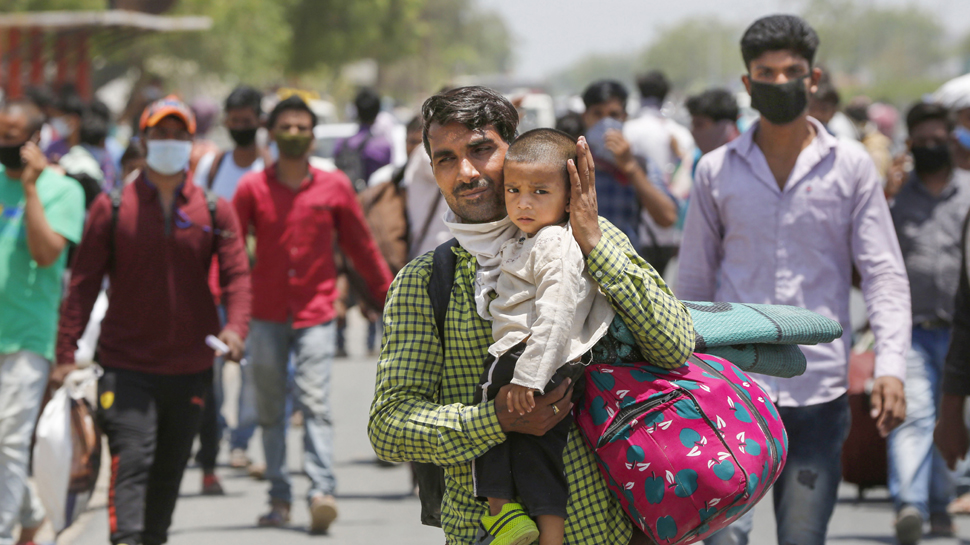

There are six major concerns that would need immediate attention pertaining to deteriorating economy, massive job losses, pathetic condition of migrant workers, rural – urban divide in terms of digitization, inadequacies of health sector and social menaces that precipitated due to lockdown compulsions
According to UNESCO, shutting down of schools due to Covid-19 pandemic comes with a warning of ‘potential for increased drop-out rates which will disproportionately affect adolescent girls, further entrench gender gaps in education and lead to increased risk of sexual exploitation, early pregnancy and early and forced marriage’. There are already reports of increased child abuse, child pornography and cases of domestic violence during this period. In view of these socio-economic challenges, the government needs to muster support from different stakeholders and adopt a decentralised approach in order to prepare a road map for short -term and long-term goals for mitigating the damage done by this unprecedented crisis. It would require a herculean effort both at macro and micro levels.
The extended lockdown period calls for digital dissemination of education to students in order to minimize the crucial time loss of academic session at all levels. But the digital deprivation in rural areas and small towns has actually exposed the rural – urban divide in terms of availability of digital infrastructure at macro level. The widespread use of technology in education clearly depicts that we are heading towards a knowledge-based society where the portals of knowledge are globally connected giving rise to a large network of information transfer. According to AISHE Report (2018-19) around 90% universities and 86% colleges in India have the facility of computer centres which shows that these are well equipped with hardware resources to facilitate online education. However, only 39 percent of Universities, 22 percent of colleges and 20 percent of stand alone institutions are connected to National Mission on Education through ICT. The statistics reveals the presence of basic minimum resources, but despite that the students studying in rural areas in India are still deprived of such advanced facilities.
In our country 65.97% population belongs to rural areas where modern facilities are still not available or moderately available due to which only a handful of institutions are able to provide online educational services to their students, for the rest it is left to the students and their personal approach and resources. In the lockdown period people are facing economic crunch due to loss of work especially those people who work in unorganised sectors like daily wagers, vendors, maintenance workers, small tradesperson etc. and most of the population in rural regions comprises of such individuals. In such circumstances, when people are unable to meet up two meals a day, it would be very harsh to assume that they would spend money on internet and Wi-Fi services to resume education of their children. Moreover, not every rural household has luxury of having a smart phone, and if they do have, then the device remains with the elders for their personal use and could not be engaged for 3-4 hours for online studies.

The other challenges
The corona crisis aggravating with the time has forced the government for an extended period of lockdown posing different challenges for governance. The government finds itself in a tricky situation to do a balancing act between saving lives of people and restoring their livelihoods. There are six major concerns that would need immediate attention pertaining to deteriorating economy, massive job losses, pathetic condition of migrant workers, rural – urban divide in terms of digitization, inadequacies of health sector and social menaces that precipitated due to lockdown compulsions.
According to the Centrum Institutional Research, the country stares at the possibility of low single-digit economic growth for the current financial year. Acuite Ratings & Research Ltd earlier estimated that lockdown will cost the Indian economy almost USD 4.64 billion everyday and that a 21 day lockdown period would have resulted in a GDP loss of almost Rs. 7.5 lakh crore. This would only lead to compounding losses with further extension of lockdown period. The sectors that are most severely hit are transport, tourism, hotel, restaurant and real estate activities. The informal sector and MSMEs would be adversely affected as these are driving force of the economy engaging a huge workforce. This would require big economic relief packages from the government to provide stimulus and increase demand in the economy.
In a situation when joblessness has increased three fold since lockdown and unemployment to 23.5 percent (CMIE data), the youth is undergoing career uncertainties and insecurities about their future. This means that one out of four people lost the job during March-April. Among large States, unemployment was highest in Tamilnadu, Jharkhand and Bihar. Moreover, University helplines are flooded with panic calls from students during the coronavirus pandemic pertaining to career related anxiety and other counselling services. UGC has directed universities and colleges to set up mental health helplines to address student’s concerns during health crisis.
The situation of migrant workers stucked during the lockdown period has also been of great concern. About 6.3 lakh migrant workers were given shelter in 22,567 government relief camps. They were stranded in the city where they work, like millions of other informal migrant labourers across the country. Many lost touch with their families. Though state government took several initiatives like providing them shelter homes, food and medical facilities, they became desperate with each passing day about their uncertain future. The scenes of massive migrant workers getting impatient to go to their native places during lockdown in various States prompted governments to make arrangements for their migration. During post-lockdown period, there is a possibility of massive job loss in informal sectors and may take several months to get back on track.
The Coronavirus pandemic has exposed the inadequacies of health infrastructure like insufficient testing labs and lack of medical equipments and practitioners that led to poor testing ratio in comparison to other nations across the world. The health needs are largely taken care of by private sector. Hospitalization capacity is very low at 0.7 beds per thousand inhabitants on an average.This demands for huge increase in public spending in the post-lockdown period in health infrastructure which has remained largely stagnant in the last two decades.










